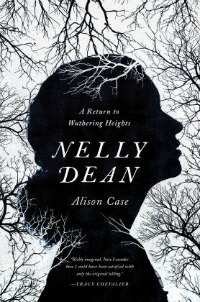2018 School Spending Survey Report
Q&A: Alison Case | Debut Spotlight, April 15, 2016
Alison Case, an English professor at Williams College, MA, intimately knows the world of 19th–century British fiction, lending an unmistakable authenticity to the language and flow of her debut novel, Nelly Dean.

Photo by Mark McCarty
Nelly Dean (LJ 10/1/15), Alison Case’s skillful re-imagining of Wuthering Heights, is a fascinating debut novel in its own right, as well as a wonderful companion to Emily Brontë’s classic. Case, an English professor at Williams College, MA, intimately knows the world of 19th–century British fiction, lending an unmistakable authenticity to the language and flow of her story. Here she discusses her literary inspiration, reliable narrators, and the popularity of classic retellings. You have previously written books about literary criticism, but Nelly Dean is your first novel. What inspired you to try fiction? I became obsessed with Nelly Dean through years of teaching Wuthering Heights. Female narrators have always interested me, but Nelly captured my attention to the extent that I wrote a chapter on her in my second book [Reading the Nineteenth–Century Novel]. After the birth of my first child, I thought more deeply about how cruel it was for Cathy to ask Nelly to leave Hareton behind—like asking a mother to abandon her child. What a traumatic experience for Nelly! I wondered if I could write a novel depicting the events from her perspective. The book couldn’t be criticism because I had to bring Nelly to life. I started hearing Nelly’s voice in my head. I didn’t think I could write a novel, but I went to a conference in which Carolyn Heilbrun (author, under the pseudonym Amanda Cross, of the “Kate Fansler” mystery series) was a presenter. She said writing fiction was a good experience for a scholar to understand the whole process behind the novel. There is a rash of stories with unreliable narrators hitting the best-seller lists now. Is Nelly a reliable narrator, given her harsh treatment at the hands of her employers? There is probably no such thing as a reliable narrator; every story is filtered through the narrator’s perception of events, colored by personal experience. Nelly believes she is telling the truth. In Wuthering Heights, she tells a lot of lies out of necessity to preserve some power and autonomy for herself. Servants are always at a disadvantage in that respect. Nelly was brought up to believe in certain values, and she does believe in them but must adjust the truth to protect herself. Do you feel Nelly’s troubles were more a consequence of class or gender? Well, both actually. A woman of her class had very few options. The culture was telling her that her only value was her usefulness to other people—to her employers. She sticks with the Earnshaws because she cannot stop thinking of them as her family. She feels most proud of herself when she is helpful to others. Nelly is a woman of her class and time. No one encourages her to develop her talents, to achieve something for herself; rather, she is told to do her duty. She is supposed to get her dignity and worth from the family for which she works. Is it necessary to have read Wuthering Heights to understand Nelly Dean? Nelly Dean is designed to stand alone without having to read Wuthering Heights. It may, however, inspire seeking out Brontë’s work. Retellings of classics seem to be perennially popular. What accounts for this ongoing trend? When we really love classic stories, we need to experience them again and again. We just can’t let them go. Which writers have influenced you? My field is 19th–century English novels, so I have to say Jane Austen, George Eliot, and the Brontës have influenced me the most. The style of Nelly Dean came from my immersion in the works of those authors. Do you have plans to write more fiction? Now that I have penned a novel, there is no going back to literary criticism. I find writing fiction so much more satisfying. I plan to take on Jane Austen’s Sanditon; to complete it. This project is still in the stock-pot stage, where I throw ideas into the pot and let them simmer. I keep adding information and ideas and stirring them around. For instance, the character of Bodkin in Nelly Dean started out as a plot convenience, but he became so much more. I think the wit and style of Austen would be fun to try. Which books have you enjoyed that you would suggest to readers? My favorite literary spin-off is Karen Joy Fowler’s The Jane Austen Book Club. For historical fiction, I would suggest Peter Carey’s Jack Maggs. I also really enjoyed Jonathan Franzen’s The Corrections. I read quite a bit of Kim Stanley Robinson’s work. Even though he writes sf, I see him as the heir to 19th-century realism.
hitting the best-seller lists now. Is Nelly a reliable narrator, given her harsh treatment at the hands of her employers? There is probably no such thing as a reliable narrator; every story is filtered through the narrator’s perception of events, colored by personal experience. Nelly believes she is telling the truth. In Wuthering Heights, she tells a lot of lies out of necessity to preserve some power and autonomy for herself. Servants are always at a disadvantage in that respect. Nelly was brought up to believe in certain values, and she does believe in them but must adjust the truth to protect herself. Do you feel Nelly’s troubles were more a consequence of class or gender? Well, both actually. A woman of her class had very few options. The culture was telling her that her only value was her usefulness to other people—to her employers. She sticks with the Earnshaws because she cannot stop thinking of them as her family. She feels most proud of herself when she is helpful to others. Nelly is a woman of her class and time. No one encourages her to develop her talents, to achieve something for herself; rather, she is told to do her duty. She is supposed to get her dignity and worth from the family for which she works. Is it necessary to have read Wuthering Heights to understand Nelly Dean? Nelly Dean is designed to stand alone without having to read Wuthering Heights. It may, however, inspire seeking out Brontë’s work. Retellings of classics seem to be perennially popular. What accounts for this ongoing trend? When we really love classic stories, we need to experience them again and again. We just can’t let them go. Which writers have influenced you? My field is 19th–century English novels, so I have to say Jane Austen, George Eliot, and the Brontës have influenced me the most. The style of Nelly Dean came from my immersion in the works of those authors. Do you have plans to write more fiction? Now that I have penned a novel, there is no going back to literary criticism. I find writing fiction so much more satisfying. I plan to take on Jane Austen’s Sanditon; to complete it. This project is still in the stock-pot stage, where I throw ideas into the pot and let them simmer. I keep adding information and ideas and stirring them around. For instance, the character of Bodkin in Nelly Dean started out as a plot convenience, but he became so much more. I think the wit and style of Austen would be fun to try. Which books have you enjoyed that you would suggest to readers? My favorite literary spin-off is Karen Joy Fowler’s The Jane Austen Book Club. For historical fiction, I would suggest Peter Carey’s Jack Maggs. I also really enjoyed Jonathan Franzen’s The Corrections. I read quite a bit of Kim Stanley Robinson’s work. Even though he writes sf, I see him as the heir to 19th-century realism.
RECOMMENDED
TECHNOLOGY
ALREADY A SUBSCRIBER? LOG IN
We are currently offering this content for free. Sign up now to activate your personal profile, where you can save articles for future viewing









Add Comment :-
Comment Policy:
Comment should not be empty !!!